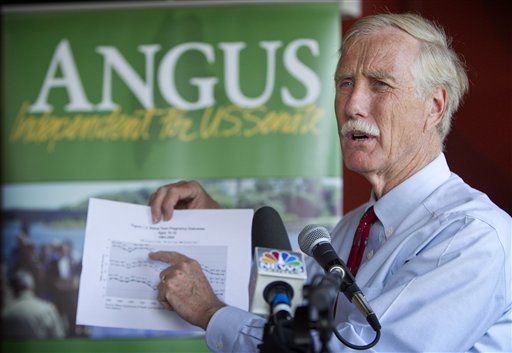Former Gov. Angus King raised $1.1 million for his independent U.S. Senate campaign in the past three months, more than doubling his closest rival’s fundraising total and setting up a big advertising push in the final weeks before Election Day.
The latest donations to King’s campaign brought his fundraising total to $2 million as of Sept. 30 and left the campaign with nearly $500,000 to spend before Nov. 6.
Republican Charlie Summers, meanwhile, raised about $441,000 in the past three months, bringing his total to $680,000 as of Sept. 30, according to updated numbers released Monday.
His campaign had $189,000 left to spend as of Sept. 30, it said.
Democrat Cynthia Dill raised about $57,000 in the most recent three-month period, bringing her total to about $148,000. Dill, who has not raised enough money to air television ads, had $10,000 on hand as of Sept. 30.
Financial reports for July 1 through Sept. 30 had to be filed by Monday with the Federal Election Commission. King and Dill released their full reports to the media, while the Summers campaign released a portion of his filing Monday. The numbers in Summers’ filing were slightly different from those reported last week.
King’s latest fundraising success, which surprised some observers, shows that he still has the momentum as the front-runner, said John Baughman, associate professor of political science at Bates College in Lewiston.
“The important thing for him is not to show any weakness,” Baughman said.
Summers, meanwhile, had to raise “big dollars” in the past few months to convince donors that he has a chance to win, Baughman said. “They didn’t have a bad reporting period, but if they are really making the case to their potential donors that this really is a race, they want to do more than that.”
King and his rivals continue to raise money for the final campaign push. Summers and King also have been getting a lot of indirect financial support from super PACs and national nonprofit groups, which have spent about $4 million on television advertising in Maine to influence the outcome of the Senate race.
Combining independent spending with campaign fundraising, about $7 million has flowed into the race for Maine’s open Senate seat. It is sure to be among the state’s most expensive races ever, but it is no longer expected to break records.
The 2008 Senate race, in which Republican Sen. Susan Collins defended her seat against Democrat Tom Allen, generated a total of about $17.5 million in campaign spending. Collins raised $8 million, Allen raised nearly $6 million and outside groups pumped in the rest.
Many political observers predicted that the retirement of Republican Sen. Olympia Snowe would lead to a spending war between the parties that could double the 2008 spending totals.
However, King’s entry into the race and early polls showing him with a nearly 30 percentage-point lead appear to have led the parties and other groups to spend money in other states.
“If they don’t think the race is going to be close, they are probably going to put the money where they can make the most difference,” Baughman said.
King has received a total of $1.1 million from donors in Maine and $974,742 from out-of-state donors, according to the campaign.
His latest 900-page finance report includes such Maine donors as Leon Gorman of Yarmouth ($2,500), Hussey Seating President Tim Hussey ($500) and Bowdoin College President Barry Mills ($2,500).
Actress Glenn Close, who has a home in Scarborough, gave King $2,500.
Out-of-state donors include President Bill Clinton’s former deputy chief of staff Harold Ickes ($500) and Democratic lobbyist Anthony Podesta ($1,000).
Sen. Diane Feinstein, D-Calif., sent a $2,500 check to the campaign, but King returned it. King spokeswoman Crystal Canney said the campaign is not accepting money from sitting senators.
The former governor has said he won’t decide which party to caucus with until he finds out if he wins and what the balance of power is in the Senate.
More than $190,000 of his donations came from a wide variety of political action committees. The PACs represent such groups as surgeons, ophthalmologists, airline pilots, carpenters and insurance companies.
The King campaign spent $1.2 million during the past three months. That includes at least $600,000 for television advertising. The campaign spends about $28,000 every two weeks on payroll.
King’s campaign is well-positioned to air more television ads. The campaign has already spent $200,000 to reserve TV air time in the final two weeks before the election, and it had $464,000 left to spend as of Sept. 30.
Staff Writer John Richardson can be contacted at 791-6324 or at: jrichardson@pressherald.com
Send questions/comments to the editors.



Comments are no longer available on this story